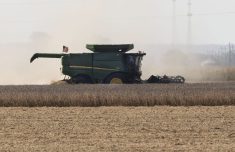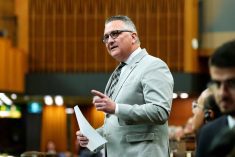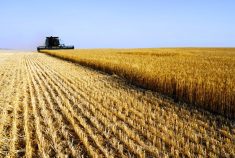WASHINGTON, D.C. — Making the world more food secure requires farmers to make more money, and probably requires fewer of them, says the U.S. Agency for International Development’s senior science adviser.
“What we’re really trying to do is get people in the farming business who really want to be in the farming business (and) to be more commercially successful, so they can do more things,” Fred Davies told agricultural journalists April 7.
“You get people to be more commercial in what they’re doing.”
He said smallholder farmers will have better lives if they can make money in farming and do better than just live hand-to-mouth.
Read Also

Alberta harvest wrapping up: report
Harvest operations advanced to 96 per cent complete in Alberta as of Oct. 7, with only a few late-seeded cereal and canola fields remaining, according to the latest provincial crop report.
USAID is part of the U.S. government’s international development system, which evolved in the 1960s. It has always focused on helping small scale farmers improve their production methods and sustainability.
Davies said making smallholder farmers more commercial is key to both making them better farmers and making their country’s more food secure.
“I would say that the best growers in the world are in the sustainability business,” said Davies.
“They don’t want to use more chemical than they have to because chemicals cost money, there are resistance problems, they want a robust system.”
He said up to 80 percent of the population lives on farms in countries such as Bangladesh and Senegal. That isn’t a freewill choice of most of them but just a product of the fact that they have no other options.
Davies said more productive agriculture would provide value-added, off-farm opportunities for many and allow committed farmers to make enough money to have lives better than mere subsistence.
It doesn’t just include food-based agriculture, he added.
For example, Kenya has a vibrant cut flowers industry, which helps its economy and provides work for many.
Davies said micro-finance, with small loans of $90, can radically improve a smallholder farm. It’s one direction in which aid agencies have moved.
Davies is a passionate supporter of genetically modification as one of the improvements that are required to sustainably support the world’s growing population. However, he said many technologies and methods are needed to maximize crop production because farmland is being lost at a great rate.
“We’re going to need that and get by with using less land to go ahead and produce more and also have higher value-added (features within the crops),” said Davies.
“It’s all a part of smart agriculture.… I’m a proponent of smart agriculture.”
Davies said a key to improving farm sustainability in the developing world is to make sure that the farmers want to farm and people who don’t want to farm can do something else.
“What can we do with those folks to make sure that some of them have the ability to become more commercial (and) get others off the farm and making money some other way?”

















